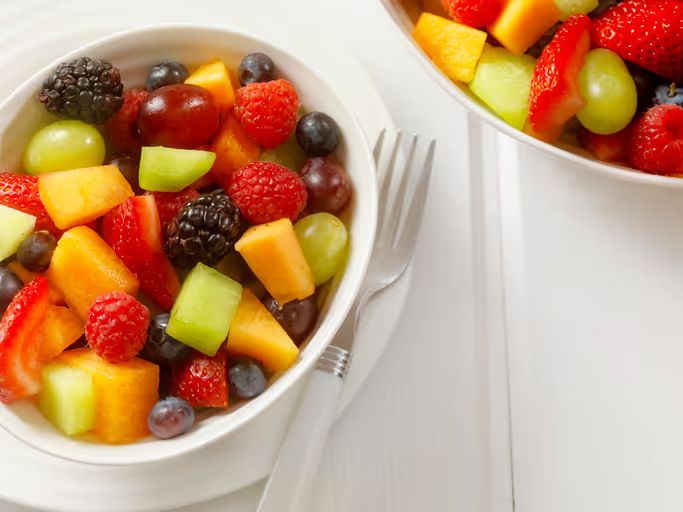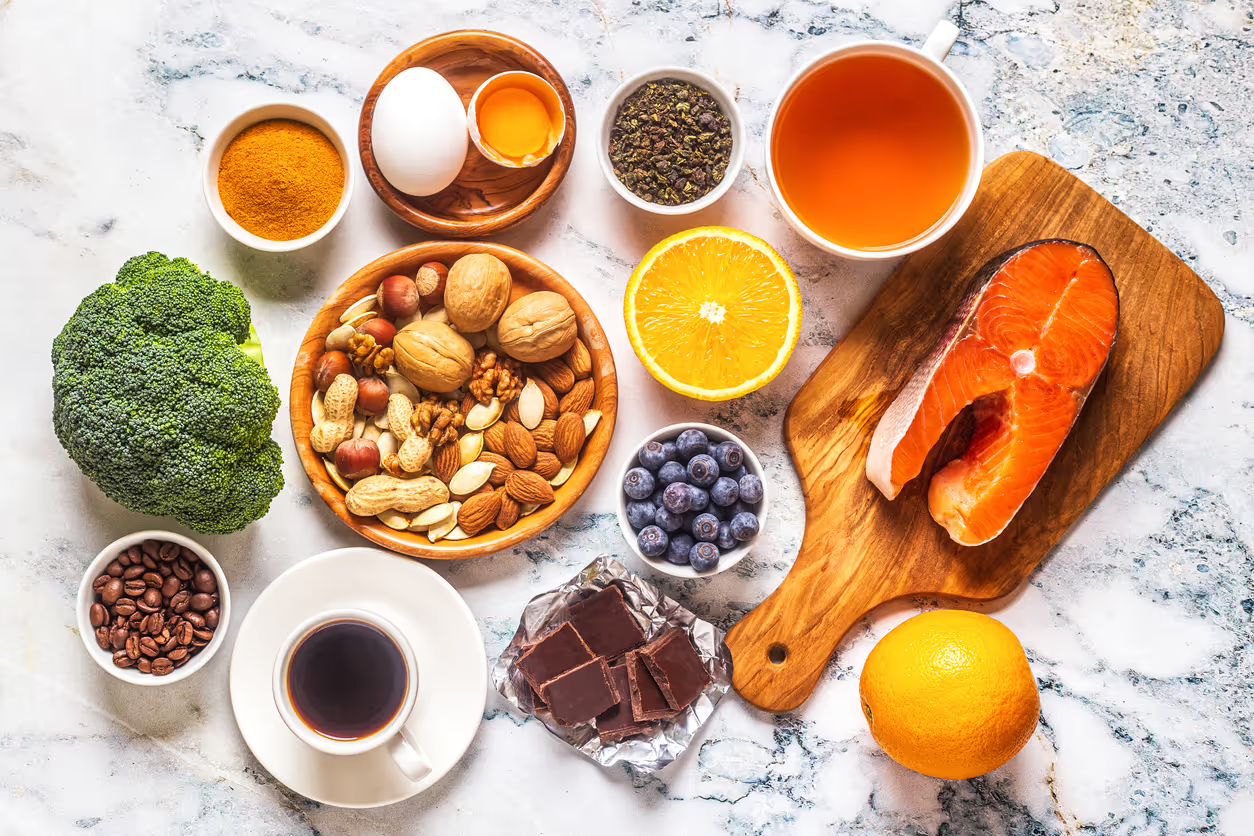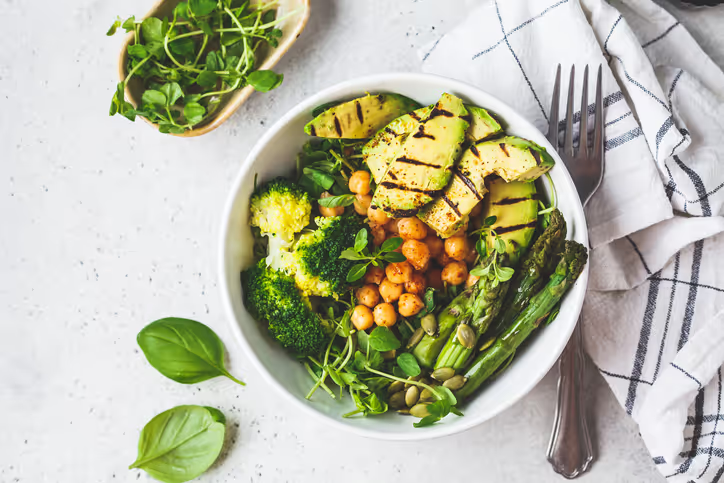Fruits are sweet, juicy, flavor-packed, and sometimes referred to as “nature's candy.” The CDC tells us fruits are vital to good health, yet 80% of Americans aren't eating enough, according to the 2020-2025 Dietary Guidelines for Americans (DGAs). Increasing your daily fruit intake is associated with lower chances of death, cardiovascular diseases, cancer, and digestive problems. But is fruit good for weight loss? This article discusses the best fruits to eat for weight loss and how you can incorporate fruit into your daily diet.
Is fruit good for weight loss?
Fruits are teeming with protective benefits from dietary fiber, carotenoids, polyphenols, antioxidants, vitamins A and C, and plenty of other essential nutrients. With fruit's impressive array of benefits, it must be helpful for weight loss, right? The short answer is yes, science confirms that fruit is a critical part of a healthy diet overall and helpful for a weight loss plan.
One large 2016 study published in PLOS Medicine followed 133,468 adults for over 24 years and discovered a link between fruit intake and greater weight loss over time. Researchers noticed that apples and berries had a more powerful effect on weight loss than other fruits.
Furthermore, a 2016 review of studies in Nutrients found a connection between eating fruit and reducing obesity. The review reports several intervention studies where participants ate fruit and had lower body weight and measurements.
What you should know about fruit and weight loss
The key to weight loss is eating fewer calories than your body uses on a day to day basis. Therefore, there's no need to be worried about what fruits make you gain weight. One single food doesn't cause weight gain, but your overall eating pattern can. Fruits are naturally low in calories and can be great substitutes for higher-calorie foods. All fruits can fit into a healthy eating pattern, but it's important to remember that some forms of fruit have more calories and added sugars than others. Eating fruits in their natural state will serve you better if weight loss is your goal. Aim to enjoy dried fruits, canned fruits in syrup, and fruit juices less often and focus primarily on fresh fruits. Here's a good example. For 100 calories, you could choose to snack on a quarter cup of raisins or one cup of grapes. You're more likely to be satisfied with fresh grapes' larger volume and water content than raisins.
14 best fruits to eat for weight loss
While other food groups face scrutiny on whether or not they're good for us, there's no argument that fruits are a hallmark of a healthy diet. Because they're loaded with must-have nutrients and naturally low in calories and fat, everyone should eat ample fruit regardless of a weight loss goal. Check out these fourteen delicious fruits you may want to add to your daily diet.
1. Grapefruit
Often, weight loss seekers stock up on fresh grapefruit with the hope of fast fat burn. Although there's no one cure-all food for weight loss, grapefruits are an excellent addition to a weight-loss diet. Chock-full of potassium, beta-carotene, and lycopene, the consumption of grapefruit supports healthy blood pressure and vision.One cup of grapefruit has only 96 calories and four grams of fiber, they have the most fiber compared to other citrus fruits. Their pinkish-red hues and juicy tart innards do not disappoint. Brighten up your green salad with chopped grapefruit segments.
2. Apple
Whether it's Gala, Pink Lady, or Golden Delicious, apples are some of the best fruits for weight loss because they're good sources of dietary fiber. One medium apple has four grams of fiber which helps you feel full and is known to lower overall food intake and reduce appetite. Make sure to eat apples with the skin on to get the full fiber benefit.
3. Pineapple
Some people shy away from highly sweet-tasting fruit like pineapples because they may feel too sugary to be healthy. But that's simply not true. Like many other fruits, pineapples contain natural sugars, but there are more nutrients to consider. Pineapples offer folate, potassium, and antioxidants that one 2021 animal study says may help lower cholesterol. One cup of pineapple chunks contains only 83 calories due to their high water content. Pair pineapple with Greek yogurt or cottage cheese for a snack that is sure to satisfy your sweet tooth.
4. Stone fruits
Apricots, peaches, cherries, nectarines, and plums fit into a category called stone fruits, which are fleshy fruits with an inner pit. Stone fruits contain lots of vitamin A and potassium and have a low glycemic index (GI), meaning they help keep your blood sugars more stable after eating. Low GI foods may help with weight loss through appetite suppression. Compared to packaged snacks with excess calories that leave you feeling hungry, stone fruits fill you up for far fewer calories. One medium peach only has 58 calories, four apricots have less than 70 calories, and two small plums contain 60 calories.
5. Kiwi
Fuzzy on the outside and green on the inside, kiwi fruits are small but mighty in nutrition. Two kiwis provide 84 calories and four grams of fiber, helping you get closer to reaching your daily fiber goals. High-fiber diets enhance gut health and increase satiety, thereby assisting weight loss. One small 2020 study from the Journal of Nutritional Science and Vitaminology found eating two kiwis every day for six weeks dropped body fat mass and blood pressure in 22 people higher in weight. Kiwi fruit is also a great source of vitamin C that helps strengthen your immune system. If you're ready to eat more kiwi, cut it in half and use a spoon to scoop out its tangy flesh.
6. Berries
Blueberries, strawberries, raspberries, and blackberries are fiber-packed. By now, we know fiber plays a critical role in weight loss. Raspberries and blackberries contain a whopping eight grams of fiber per cup and just 60 calories. In addition, blueberries are low in calories (just 84) and pack 4 grams of fiber in a cup. Finally, berries get their color from phytonutrients which function as antioxidants, helping to lower inflammation in the body. These phytonutrients give berries some of their weight-loss promoting benefits. according to research.
7. Melons
Melons are fleshy fruit with a hard outer rind and belong to the same family as cucumbers and pumpkins. You can eat a whole cup of melon for 60 calories. Melons aren't fiber-rich, but they have plenty of beta-carotene and potassium. They are in the top five highest water-containing fruits. This high water content may help you lose weight and enhance the breakdown of body fat.
8. Lemon
The fragrant fruits aren't as easy to eat as orange wedges, thanks to their acidity and sour taste. Over the last decade,drinking lemon water became a popular weight loss strategy; however, there isn't evidence this works. But, replacing high-calorie beverages with a squeeze of lemon in water could reduce daily calories, helping to drive weight loss. Lemon has vitamin C, polyphenols, and other bioactive components that may help promote healthy aging. But don't toss out its peel. Recent research says the compounds in lemon peel may help fight inflammation, often present in conditions like obesity. Try adding a quarter slice of lemon (with peel) to your fruit smoothie.
9. Passion fruit
Passion fruit is a tropical fruit native to South America with multiple varieties⸺some yellow and some purple. Their inner flesh is full of many seeds, which are high in protein and healthy fats, two nutrients that can help you feel more satisfied after eating and encourage weight loss. A small purple passion fruit is high in vitamin C, iron, and fiber and only contains 18 calories.
10. Rhubarb
Rhubarb is a traditional herb used in Chinese medicine, so it's technically not a fruit; however, it's commonly used like fruit in recipes. Rhubarb presents in long ruby red stalks with ample calcium, potassium, vitamin A, and vitamin K. One cup of diced rhubarb provides 107 calories and 2 grams of fiber. With only five grams of carbohydrates, rhubarb may be an excellent option for people prone to elevated blood sugar levels. They may also be helpful for those watching their intake of carbohydrates.
11. Orange
Oranges are a low-calorie fruit and pack an impressive punch of nutrition from vitamin C, calcium, potassium, fiber, and vitamin A. Many people in the U.S. opt for orange juice versus eating whole oranges. While a cold glass of OJ is refreshing and delicious, eating whole oranges does a better job of helping you to stay full. One medium orange has 65 calories and 3 grams of fiber which benefits your blood sugar levels more than orange juice. Pair your orange with a source of protein for a satisfying and nutrient dense snack.
12. Banana
The average American consumes approximately thirteen pounds of bananas per year! Despite their popularity, bananas sometimes get a bad rap for their carbohydrate content, causing some to feel they may sabotage their weight loss plans. The truth is bananas are loaded with a wide variety of nutrients that can help facilitate healthy weight loss. They're rich sources of phytosterols, carotenoids, and phenolics which are bioactive components that promote good health and disease protection. Plus, they have a low to medium Glycemic Index (GI), which can help balance blood sugars and regulate weight by helping curb the appetite. Additionally, bananas are a rich source of fiber, manganese, magnesium, and potassium.. One medium banana contains 105 calories and three grams of fiber. According to research, unripe bananas are excellent sources of a dietary fiber called resistant starch, which has a promising effect on gut health and weight loss.
13. Avocado
Avocados have grown hugely popular in the last decade, and rightfully so, because they're versatile, creamy, and chock-full of nutrition. Half an avocado has 114 calories, 4 grams of fiber, and 11 grams of heart-healthy fats. Because avocados are calorie-dense, some believe they can make you gain weight, but science says otherwise. One 2019 study published in Current Developments in Nutrition followed 51 people with higher body weights. All participants ate a low-calorie diet; some included one avocado daily, while others didn't. After 12 weeks, both groups lost significant weight, showing that you can also lose weight and eat avocados. Ready to eat avocados? Mash avocados into a dip and eat with sliced peppers.
14. Papaya
Well loved worldwide, papaya is a tropical fruit with high concentrations of healthy compounds like beta-cryptoxanthin, lycopene, beta carotene, B vitamins, vitamins A, C, and E. One small papaya contains 67 calories.. Routinely enjoying low-calorie foods can help maintain weight loss. If you can't find fresh papaya at your local store, try using frozen papaya in a fruit smoothie.
How much fruit should you eat for weight loss?
The bottom line is that fruits are a necessary and nourishing part of a healthy life. That said, eating fruit all day long might not be effective for weight loss, but it can be used as a part of a healthy weight loss diet. You would fare better eating fruits and other food groups to nourish your body and give you a balanced variety of nutrients. Eating an average of 1 ½ to 2 cups of fruits daily is recommended, with one cup being about the size of your fist.This list of healthy fruits for weight loss can serve as a guide for your next shopping trip!
How Form Health can help you reach your dietary and weight loss goals
Even small adjustments to your eating habits can work to your benefit and support healthy weight loss. Whether topping your bowl of oatmeal with blueberries in the morning or packing kiwi fruit to snack on in the afternoon, making fruit a part of your eating plan can help you reach your goals. For more personalized support from Registered Dietitians, get in touch with Form Health. If you're having trouble losing weight even after improving your diet, Form Health medical weight loss may be right for you.




